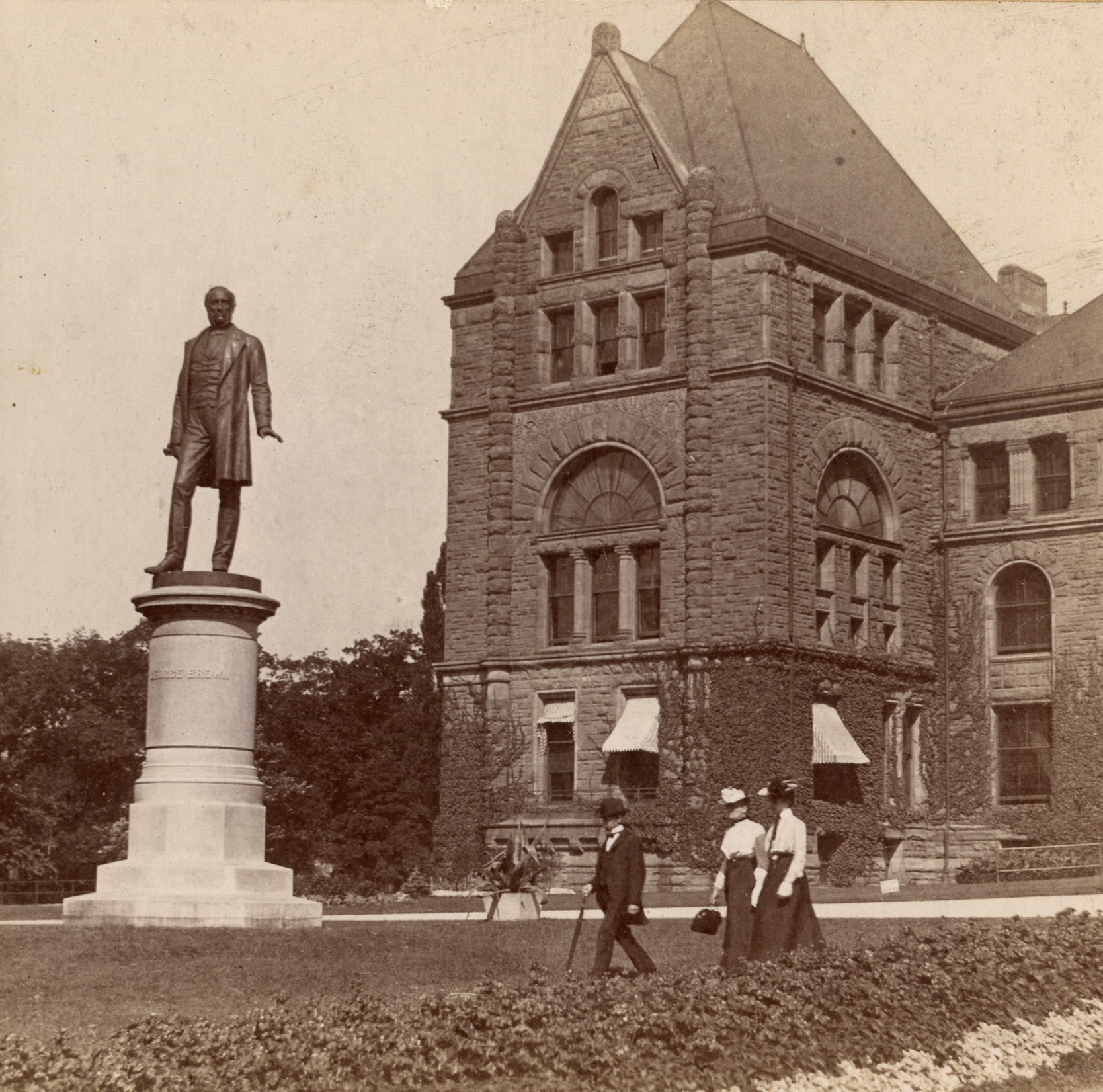
While Berliners followed Welland Canal plot developments and the Montreal Canadiens’ Stanley Cup victory over the Portland Rosebuds, local events and issues were just as engrossing. Good quality hides were scarce and leather tanners and boot makers paid the highest prices in memory. The local Board of Health was busy with ongoing meat inspection issues and urban dairy farmers who sold unpasteurized milk. The “700 men in three weeks” campaign was 500 men short as it entered its ultimate week. And the name change? Well, things were about to get a tad interesting.
The Committee of 99
Berlin, Ontario’s city council ploughed ahead with the name change, assuming they would receive Queen’s Park’s green light. The evening before pro- and anti- name change delegates stood before the Private Bills Committee, Aldermen Cleghorn and Hallman’s motion to appoint a committee to decide on the city’s new name roused the usual arguments. Mayor Hett (supported by Alderman Gallagher) held true to democratic ideals and wanted ratepayers to have the final say; Cleghorn held true to Board of Trade ideals and wanted to keep voters away from such an important decision. Only after Alderman Rudell suggested Queen’s Park may force a public vote, did the Board of Traders on council acquiesce to the possibility of the electorate’s input.
Council tasked a group to sift through the thousands of suggestions and create a short list of six city names. This “Committee of 99” would be made up of the entire city council, along with representatives from both school boards, the Light Commission, the Board of Trade, the Manufacturing, Retail Merchants, and Commercial Travellers Associations, the Library Board, Park Board, Board of Health, Collegiate Board and church ministers.
Two delegations go to Toronto
The tone of news coverage of the Private Bills Committee meeting ranged from that of a petulant child’s tantrum (The Berlin Daily Telegraph), to disappointed but somewhat neutral (The Berlin News-Record), to fair and balanced (Canadian Press). I drew this summary from the Canadian Press’s version of events.
The Private Bills Committee’s chairman declared the bill lost and before it could be taken to a vote, the entire thing was thrown out. If passed, Berlin’s city fathers would have had the power to rename the city, without a public vote.
The Committee heard from the pro- and anti- delegates. Representing the pro-name changers was Berlin’s solicitor, Mr Sims. He reported 1170 of 5000 eligible ratepayers signed the citizens’ petition wanting to change the city’s name. When two Committee members mentioned a public vote, Sims rejected the idea and claimed: “[I]t would only result in a race cry.” He suggested Berlin’s situation was akin to renaming Kenora (Technically, not so: In 1905 Keewatin, Norman, and Rat Portage amalgamated; “Kenora,” was created by combining the first two letters of each of those communities’ names). A Committee member said Berlin’s name change was closer to Petrograd’s renaming (The Russian Imperial government removed St. Peterburg’s German influences (Sankt and -burg)).
Representing the anti-name changers was a Waterloo lawyer, Mr McBride. He reported his group’s petition attracted 900 signatures. He noted that 37 per cent those who signed the pro- side’s papers couldn’t vote, 20 per cent weren’t property owners, and 10 per cent “weren’t even tenants;” some (six) manufacturers’ names appeared on both petitions.
A pro- delegate retorted 35 per cent of names on the anti- petition were foreign-born. Then he ventured on a recruitment tangent–by his logic, if every person who signed the anti-name change petition signed up for the 118th, the battalion would be raised. Then he claimed, “[T]here was not a man on this council on whom the name did not grate and sound repulsive.”
According to the Canadian Press reporter, “If the discussion had lasted any longer, a firefight would have resulted because pro-Berlin and anti-Berlin elements started to hurl insults around the room.”
Apparently the verbal volleys and bluster continued outside the meeting room. According to The Daily Telegraph, the city councillors even threatened to resign en masse if Committee members didn’t change their minds and support the name change.
Sour grapes on the sweetest peach
The next day, The Daily Telegraph ran an interview with an unnamed alderman who was also a “prominent member of Berlin’s city council.” He commented on the Private Bills Committee itself: Members “were not doing any business that they could avoid doing.” They cut off both delegations’ lawyers. He questioned the appropriateness of having the provinces’ attorney general as chair. He disliked the group’s “expert character.” They also didn’t treat the issue as a private member’s bill, but as the government drew up the papers. “This one thing I especially observed. The members have evidently discussed the make-up of the signers of the two petitions. One of the Committee [referred] to the signers of the petition favouring the change of name said with a sneer, “temperance petition”—which then led to speculation Hearst’s party members being sore over the upcoming prohibition
And his words about the anti-name changers?
“Well, they “acted like a man who found himself under a peach tree with the intention of knocking down a good peach and suddenly being hit on the head by something discovered that the nicest peach on the tree had fallen on him. They were pleased, but they didn’t seem to know how it all happened.”
As Yogi Berra will say some 57 years later: it ain’t over until it’s over.
Want a bit more information?
The Recipe

Tinned fruit was available in stores, but many housewives put up preserves. This recipe for peach pudding seemed to be written by a home canner, as evidenced by the ingredient “1 jar peaches with juice.” If you don’t preserve your own fruit, use what you find on shop shelves—I did.
My adaptation adds extra leavener, for a lighter sponge, but in its original form, the pudding is essentially fruit in a pancake-like batter—akin to clafoutis, I suppose. Mrs Witt may have prepared this in one large pan, to be spooned out—which you can certainly do—but I opted for personal peach puds.
Peach Pudding (Mrs Wm Witt.The Berlin Cook Book (1906): Take 3 eggs, 1 cup milk, 1 cup flour, 1 teaspoon baking powder, 1 teaspoon vanilla, 1 jar peaches with juice, beat eggs well, then add milk, flour, baking powder and vanilla; peaches at last. Bake 1 hour. Serve hot with sauce or cold with cream.
Peach Pudding (Adapted; Modern Equivalent)
Yield: 6 Servings
| 3 | 3 | 3 | Eggs (see notes) |
| 270ml | 270ml | 1 Cup + 2 generous Tablespoons | Milk |
| 85ml | 85ml | 1/3 Cup | Canning Syrup |
| 5ml | 5ml | 1 Teaspoon | Vanilla |
| 50g | 60ml | ¼ cup | Sugar, to taste |
| 170g | 285ml | 1Cup + 2 Tablespoons | All-purpose flour |
| 15ml | 15ml | 1 Tablespoon | Baking powder (see notes) |
| Pinch salt | |||
| 6 | 6 | 6 | Canned peach halves (or slices to make up the equivalent) |
| Butter (to grease the ramekins) |
Beat together the eggs, milk, canning syrup and vanilla. Mix in enough sugar to taste. Set aside.
Sift together the dry ingredients. Fold into the wet ingredients in two or three additions and mix until you get a smooth, pancake-like batter. Let sit for about 10 minutes.
Meanwhile, preheat the oven to 190C/375F. Butter six ramekins and divide the peaches between the pots, then pour in the batter. Create a bain-marie by setting the ramekins in a roasting tin, pour hot water into the tin, so that it comes about half-way up the side of the pots.
Bake 45-60 minutes, or until an inserted skewer comes out clean, the cake is dappled, the edges are burnished and have pulled way from the sides.
Serve with Crème Anglaise, ice cream or Chantilly cream.
Notes
- The original version was heavier and eggier than I prefer, so I adapted the recipe to make it a lighter sponge, by adding more baking powder (as if using a supercharged self-raising flour). The left and centre pudding (in the picture) are the straight translation and the one on the right is the adapted recipe
- If you want the straight modernisation (serves 4):
- 2 (large) eggs, 190ml milk, 3 Tbsp canning syrup, ¾ tsp vanilla, 115g all-purpose flour, ¾ tsp baking powder; 4 canned peach halves (or equivalent)—procedure as above, but fold the fruit into the batter, instead of blanketing the peaches. Use four ramekins.
- About eggs: Chances are Mrs Witt had what would be the equivalent of medium-sized eggs (49-55g each, in shell). As the adaptation increases the number of servings, and I have large eggs, I used three eggs.
- For more information on Canadian egg sizing, please visit the Egg Farmers of Canada’s website.
